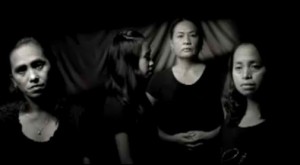By AVIGAIL OLARTE
GATHERED around the table were mother, father and son. It was November 20th, a Friday. It would be their last supper together.
That day Jolito Evardo traveled home to Davao to say goodbye to his parents.
“Ma, I’m going to Shariff Aguak,” the UNTV video editor said.
“Isn’t that a dangerous place?” his father asked.
“But it’s for work,” he insisted. “Besides, there will be four of us.”
He then hurried to leave, saying the rest of the crew was waiting for him. He grabbed his pack, boarded a jeep, and waved goodbye. Jolito wore the shirt his mother got him at the market earlier that day. He picked the color black, as if predicting his own death.
“Gusto ko siyang pigilan pero di ko maibuka ang bibig ko. Sising-sisi ako (I wasn’t able to dissuade him. I tried to but I couldn’t. Now I deeply regret it),” his mother, Juliet Evardo, said in an anguished voice.
As she gripped the hem of her thin, black skirt, tears rushed from her eyes. Over and over she cried, “Kung alam ko lang. Sana niyakap ko siya nang matagal (If only I knew, I would have hugged him longer).”
Three days later, Juliet would lose her son. Jolito was 24.
Now a year after, justice remains elusive to Evardo and to 57 others who were brutally slaughtered in Ampatuan, Maguindanao that morning on Nov. 23. They all went along with a politician’s convoy for different reasons, but they all ended up together, dead, in that clumsily dug up grave.
For the mothers, wives and relatives of the slain, life took on a different turn.
There are those like Juliet who continue to fight despite their frustration over the slow pace of the trial proceedings. Despite the lack of compensation from the government, mothers like her make do with the little they have to attend hearings while struggling to feed a household.
Wives like Myrna Reblando, spouse of Manila Bulletin writer Alejandro Reblando, is one of the few brave enough to express outrage, speak on behalf of the group, to hold authorities and those responsible for the deaths accountable.
But both Juliet and Myrna say they have high hopes on President Aquino, especially with his promise shortly after he was elected that he will put the perpetrators behind bars.
One of the ways, they said, is for government to seek the support of the United Nations to aid the state in prosecuting crimes. The President should also push for the live coverage of the trial to create public outcry against such atrocities. This may also lessen the threats and continuous harassments against them and their children. (See videos below)
The National Union of Journalists of the Philippines has recorded 143 deaths of journalists since 1986. Of these, only seven cases ended up with convictions. The Philippines is consistently tagged as the most dangerous place for journalists and as the worst peace-time democracy in the world due to the number of unresolved killings.
